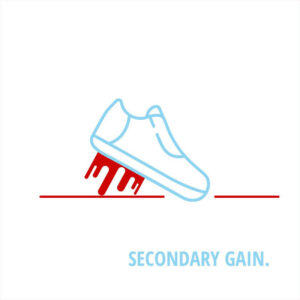Secondary gain. What is it?
Secondary gain is an invisible force that keeps us stuck in unhealthy patterns. Secondary gain means that we have learned to get some benefit from our problems. Basically, sometimes we get into a habit of being defined by our problems; they become like a comfortable pair of shoes. Or we learn that our problems help us gain attention from people in our worlds, whether positive or negative. We can therefore stop wanting to help ourselves; we choose the stagnant way of living rather than finding recovery and growth. While we may verbally complain, our actions say we are strangely content and comfortable with sitting in our own mess.
Someone who keeps damaging their relationships because they like the drama or the power is experiencing secondary gain. Another example is someone who enjoys illness because the attention makes them feel special (with an extreme example being hypochondriasis). Or someone who stays in their bad situation because they are so fearful of change. Or the person with the martyr complex, who plays the role of the reluctant doer and carer for others and doesn’t know how to stop. Or our disability might have become part of our identity, the way that we think of ourselves. Here’s a classic example: consider a person who is receiving long-term disability payments for depression. To qualify for the payment, they have had to prove how profoundly depressed they are and what a negative impact this is having on their ability to function. This creates the sense that they are defined by their depression, and the expectation that they will be depressed for life. They stop looking for work. They restrict their expectations of themselves. They stagnate and resign themselves to not joining the workforce again. The payment itself, then, can be seen as a secondary gain that has had a negative effect.
Secondary gain is the hidden force that sabotages us and makes us resistant to change and growth. We usually have no idea that this is going on. In this situation, if we had a magical bean to fix our problems, we might not take it because it would mean losing the secondary gains that we get from our problems. If secondary gain is sabotaging our chances of making positive change, we need to recogise it so that we can undo its influence.



Subscribe To Our Newsletter
Join our mailing list to receive Psych wisdom, advice and encouragement once a month.
"The Skills we need are not just common sense, we need to learn them from somewhere"
You have Successfully Subscribed!